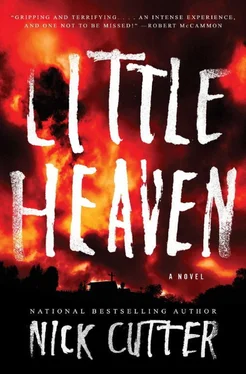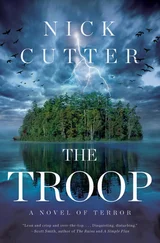Come to me, my lamb.
These were the only words at first.
Amos had left his ministry in San Francisco to follow that voice. By car, by bus, on foot. He traveled many miles. The voice grew stronger. He did not eat and scarcely slept. The pull of the voice obliterated those needs. There were times during his pilgrimage when he thought he’d go mad or collapse. But the voice guided him through despair.
Come to me, my lamb.
Amos followed the voice to this spot—it was easy, like scanning a radio dial until you tuned in to a powerful frequency. He was exhausted by the time he arrived, his sandals nearly disintegrated from the thirteen-mile hike through the woods. At some point, everything went black. A fugue state. And when the darkness cleared, he was where he was meant to be.
Nothing about the spot screamed out, Behold, the seat of the Divine! Just trees and scrub. Had he been a bit more aware, Amos might have noticed how the sounds of nature had bled into a relative silence the closer he drew to the site. The chirping of the birds died away, as did the rustle of animals in the underbrush.
But the voice overpowered all of that. Once he had tuned in to this unearthly transmission, a direct conduit to the Lord, Amos beckoned his flock. They came, as he had known they would—they would follow their prophet. They helped build Little Heaven to Amos’s exact specifications.
Not all of them had come. He had ministered to some two hundred souls in San Francisco. Only a quarter of them made the trek into the wilds of New Mexico. Still, Amos was satisfied. Most importantly, they were families. Mothers and fathers, sons and daughters. They were so much better than fifty directionless souls who could lose faith at any moment. Families stayed together. Bloodlines ran thick, oh yes.
They had been here nearly six months. Things were not perfect, but then, things never were. A few outbuildings had collapsed in a freak windstorm. Two worshippers were bitten by snakes. Greta Hughes, the children’s teacher, had broken her leg in a construction mishap. The limb had become gangrenous. Neither the ministrations of Colby Lewis, a onetime medic in the Vietnam War, or the flock’s upbeat prayers had much effect. The Hughes woman wept wretchedly as she was shipped back to the devil’s den of society.
God must test the pure of heart in order to cull the wicked and slothful from their number , Amos had counseled his flock at that evening’s sermon.
There had been one or two other… events. Isolated incidents. Nothing worth dwelling on. A few of the elect had claimed to see things. Shapes in the woods at night. Sounds that could not be accounted for by natural means. Amos had dealt with those complaints harshly. Such hysterics had no place at Little Heaven.
The children, too. Some of them were having trouble adjusting. Their behavior was perhaps a little off from time to time. But that, too, was to be expected. Everyone had to adjust. The poisonous teat of civilization, with its televisions and pinball machines and McDonald’s hamburgers: you had to wean yourself from that vile nipple. The children struggled with this more than the rest of Amos’s worshippers, but—
You were fiddling with yourself, weren’t you? Milking your dirty stick so it would spurt. It is what syphilitic perverts do to themselves. It stains the soul, boy—and yours is stained already, isn’t it?
“Hush’m, hush’m, hush’m!”
Amos spoke in a reedy singsong, the tone of voice you might use to head off an argument. It was a tone his worshippers would find quite different from the rich baritone that issued from his chest during sermons.
Smutty little fiddler fiddling with his dirty filthy stick—
Amos ground his teeth. It sounded like cement blocks rubbing together inside his head. He stared over the trees at the rock formation looming against the sky. It was darker than the night, as though carved out of a different kind of blackness altogether.
The Devil’s Rock. That was its name, according to some mountaineering guide Brother Fairweather had showed him. No matter. It was not for mankind to name the works of the Creator. We must humble ourselves before Him.
Big Heaven. Not the Devil’s Rock. That was Amos’s self-given name for the skyscraping formation that rose pillar-like from the forest floor. He had built Little Heaven, which stood in the shadow of Big Heaven, which itself stood in the shadow of God Himself. He pictured Big Heaven as a massive antenna broadcasting the Lord’s voice to his ears alone…
…although he had to admit that sometimes the voice did not sound as though it belonged to God. Just the odd blip where… Well, it was like when you were on a road trip and you lost the radio signal. That was the only analogy Amos could come up with—the sort of obvious comparison he worked into his sermons so that the more squirrel-headed members of his flock could grasp it. When you were driving and lost one radio station but started to pull in another at almost the same time. That brief span where the frequencies got crossed.
This was how it felt. God’s voice—the calm, uplifting one—would bleed away the tiniest bit and another voice would interfere for just a moment. And this other voice was different.
It wasn’t even a voice, precisely. Amos could call it that only insofar as it spoke to him, though not so much in words. Amos Flesher envisioned an immense dark space teeming with flies, their wings and legs producing a hum that rose and fell in sonorous waves to fill the void with the sound of their mindless industry.
Flies, and something else. A silky constriction that pinged on a fainter sonic register—a rhythmic coiling and tightening that called to mind a sightless worm of endless length braiding over and around itself in knots of terrifying complexity. The rub of its flesh produced a delicate hiss that was somehow staticky, like the sound on a vinyl record between songs.
This voice— was it a voice?—this presence would occasionally intrude upon the voice of God. Amos would flinch from it, shaking his head to fling it out of his mind.
Just a blip. Then it was gone again.
Amos Flesher stared over his fiefdom, shrouded in midnight dark. He heard no voice now. He heard nothing at all. Only the jumpy beat of his own heart.
THE ROAD RIBBONED EASTWARD,flat and gray in the morning sunlight. They had been driving for hours: Micah, Minerva, and Ellen in Ellen’s ’57 Oldsmobile. Ebenezer followed on a Honda CB77 motorcycle he had bought from a pawn agent in Albuquerque. Evidently he wasn’t entirely sold on the idea and wanted to be able to skedaddle if things went hinky.
They had stopped in Albuquerque for the motorcycle, gasoline, and camping gear. They bought backpacks, boots, tents, and sleeping bags. Lost hikers—that would be their angle. They would hike it to Little Heaven. Ellen knew its whereabouts; her sister had demanded that Reggie tell her, going so far as to make him draw a map and mail it to her in jail. If they needed a closer look, they would claim to be lost and appeal upon the Little Heavenites’ Christian decency for a night’s sanctuary. Once they knew the boy was well cared for, they would thank the Bible bashers for their hospitality and leave them to their woodland rites.
According to Ellen, the settlement nearest to Little Heaven was Grinder’s Switch. A village of less than three hundred souls situated in a valley, with the wilderness unfolding to the north and east. They drove down a single-lane blacktop banded by vast sweeps of sorghum. They passed the odd billboard for Dash laundry soap or Lestoil or Winston Super Kings, but most of the billboards were of a religious nature.
Читать дальше












